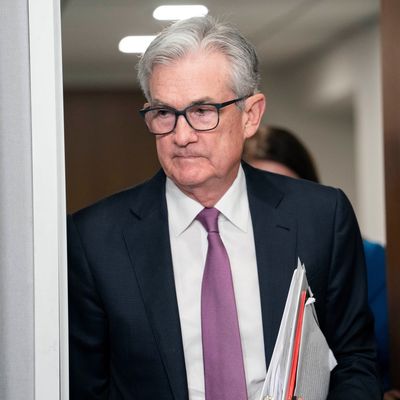
It is not the job of the chairman of the Federal Reserve to provide comfort to the American people. For anyone living under the heavy burden of life in this economy, finding it difficult to afford a place to live or groceries to cook, Jerome Powell’s speech today — an unusual update from a central bank head at the annual Jackson Hole, Wyoming, retreat — would have been especially cold comfort. While it is the responsibility of the Fed to keep inflation low and employment high, the predicament that Powell faces right now, more than 18 months into this era of high inflation, is that any progress made so far could quickly reverse, a sign of how delicate this recovery is. That means that the route to a smoother economy may have to go through a much rougher patch. And that, essentially, is what Powell told the world would be happening today.
“While higher interest rates, slower growth, and softer labor market conditions will bring down inflation, they will also bring some pain to households and businesses,” Powell said in a sober eight-and-a-half-minute speech. “These are the unfortunate costs of reducing inflation. But a failure to restore price stability would mean far greater pain.”
The operative word here is greater. In the eyes of the world’s most powerful central banker, there is no good solution here. Powell’s main tool right now is raising interest rates, and the Fed has recently hiked interest rates at the fastest pace in about 40 years. Powell made it clear that he is going to keep on sucking money out of the financial system until inflation is good and dead. But this comes at a cost: Businesses will find it harder to expand, consumers will be less likely to spend, and layoffs are probably going to keep rising. The odds of a coming recession are still high. As far as the Fed is concerned, this is the lesser evil.
Whether Powell actually has the wherewithal to pull this off is another thing. “Chairman Powell’s speech today was incredibly anticlimactic,” Chris Zaccarelli, chief investment officer for Independent Advisor Alliance, said in a note. Some on Wall Street just don’t believe that he will stick to a tough stance, especially since the Fed’s preferred way of measuring inflation improved in July, and an important consumer-sentiment survey also showed that people were more optimistic about inflation in the future. That last data point is especially important, as it played into the Fed’s decision to rev up interest-rate hikes in June to 0.75 percent. “If the public expects that inflation will remain low and stable over time, then, absent major shocks, it likely will,” Powell said today. “Unfortunately, the same is true of expectations of high and volatile inflation.”
The worry here is that, whatever is causing prices to rise — higher demand, war, supply-chain issues — the underlying problems might not get fixed after just a few months of more expensive borrowing costs. Even though prices stayed roughly flat last month, that was because of a drop in oil and gas prices — something the Fed has absolutely no control over, especially since the energy supply is mangled by the war in Ukraine. Whatever cost savings consumers saw from that relief were then eaten up by an increase in shelter and food costs. While the Fed doesn’t really like to factor in food prices — too volatile — the rising costs of not being homeless is squarely in its purview. (Shelter accounts for about a third of the formula that goes into the Consumer Price Index, the federal government’s broad inflation gauge.) According to Redfin, monthly rent prices are still going up just about everywhere, as the cost of buying a home gets increasingly prohibitive. (Mortgage rates have started to climb again after a brief dip and are now about double what they were at this point last year.)
Powell didn’t make it explicitly clear what’s going to happen at the next meeting of the Federal Open Market Committee, but then again, he didn’t really need to. Other Fed governors, like James Bullard, have made the case for moving fast, damn whatever jolts there may be to the economy, since they’re going to have to get rates high eventually anyway. Powell’s tone kind of said it anyway: He was short, to the point, and seemed unhappy about the whole thing. If the economy is really dependent on vibes, that’s not one to give off if things are going to get better anytime soon.






























